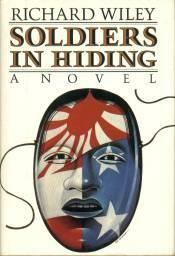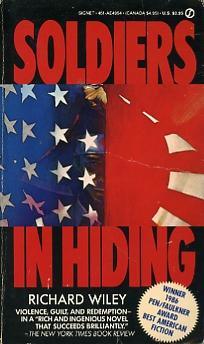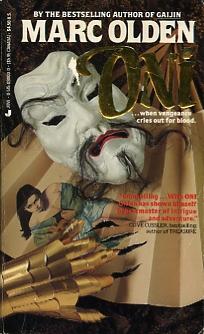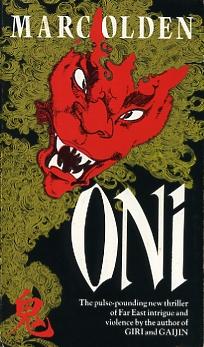Americans utterly lost
Search for self and corporate conspiracies
By William Wetherall
Richard Wiley, Soldiers in Hiding, 1986
Marc Olden, Oni, 1987
A version of this article appeared in
The Japan Times, 26 March 1988, page 16
These two novels have everything and nothing in common.
Both are impossible to put down: Richard Wiley's Soldiers in Hiding because its story of a Japanese-American Japanese (a Japanese citizen who was formerly an American citizen of Japanese ancestry) is so sensitive, thought-provoking, full of understatement and irony; Marc Olden's Oni because, like his other potboilers with Japanese themes (Giri, Dai-Sho, Gaijin), its story -- of a powerful Japanese woman who is bent on keeping her hold on the biggest corporate empire in the world at any cost -- is so vulgar and violent, unredeemingly paranoid, and outrageously entertaining.
Fiction is supposed to be real only in the reader's mind, and only while the reader is actually reading and believing the story. The well-told story merely induces a "willing suspension of disbelief" that lasts until the "fictional dream" is interrupted by an intrusive word, sentence or thought, an abrupt ending, or a ringing telephone.
Novelists, though, try to enlighten as much as entertain. They set their untrue story on the most realistic stage possible. Similarities between the story and the real world are rarely if ever coincidental. Even when the story is nominally imaginary, its social and cultural details can harmonize so closely with the reader's preconceptions of (and preoccupations with) the real world, that the reader takes the setting (if not the story itself) as true.
In search of selfRichard Wiley Stereotype baiting is not such a problem in Soldiers in Hiding. Wiley's narrator, Teddy Maki, is a reasonably credible composite of the real Nisei (native-born Americans whose parents were Japanese immigrants) who were forced to enlist in the Japanese Army because they were in Japan when their ancestorland bombed their homeland. Maki and his best friend, Jimmy Yamamoto grew up together in Los Angeles and became musicians. They have an opportunity to work in Tokyo through an agent called Ike, who encourages Jimmy to court his sister Kazuko. Jimmy and Kazuko marry, but war comes, and the three men are sent to the Philippines in the same unit. Only Teddy comes back alive. He believes that Ike was killed on a jungle patrol which he alone survived. He witnesses his commanding officer shoot Jimmy when he refuses to execute an American POW who he has been caught giving candy to and speaking English with. Teddy, also suspected of being sympathetic, executes the POW and saves himself. Teddy, when discharged, marries Jimmy's pregnant widow. They lose their home in an air raid and greet the occupation in a refugee camp. Teddy fails to regain his American citizenship but becomes a popular entertainer. Ike turns up decades later with a Filipino wife and two kids, a straggler who stayed and went native. The narrative begins with Teddy sending some American tourists on a wild goose chase away from Tokyo Tower. "All I wanted was the simple pleasure of knowing that I had wronged slightly, now, some of those who had wronged me in the past," he muses. He doubts the efficacy of his revengeful behavior when later he runs into the same tourists and learns that they not only found a golden egg in Ueno Zoo at the end of the chase, but blame themselves for bumbling his instructions. In the closing scene, Teddy offers to help a "foreign-looking man" who seems to be a tourist. "From his accent I can tell that he is American. From his story that he is utterly lost." Teddy's story, too, shows how his kind of former American can become and remain lost. In telling it, author Wiley's concern with the ambivalencies of competing ethnic and national identities is at times too conscious. But he very appropriately (and sometimes poignantly) expresses this concern at a personal rather than political level. The whole novel may be read, however, as a commentary on the human consequences of war and other political folly. |
Corporate conspiraciesMarc Olden Olden, the most prolific hack in the Shogunesque genre, appeals to the easier emotions of sex and violence, and plays to the yellow-peril audience. His bad guys wear the clothes of the villains that are the objects of present-day "Japan bashing" in the United States. Oni, the demon, is Viktor Poltava, "the bastard son of a Russian journalist and a Tokyo waitress." Poltava, born and raised in Japan, is a personification of evil that results from a childhood of racial discrimination and a grandmotherly initiation into the occult. His murderous martial arts are employed by Japan's biggest multinational corporation, Mujin ("eternal"), a conglomerate ruled by an old Japanese family that wants to dominate American markets through a "carefully orchestrated propaganda campaign . . . that had begun during the waning days of World War Two." Helping Mujin achieve its nationalistic goals is an American man, Warren Ganis, who as a boy became the homosexual lover of Yasuda Gennai, then heir to and now the dying president of the Mujin empire. Ganis proved his loyalty to the Gennai family by murdering his own parents and becoming an accomplice in a covered-up slaughter of western POWs in Japan. He is now a media monger backed by Mujin money to facilitate Japan's infiltration of America's information industry. Mujin "had managed to keep Congress at bay for years, stopping lawmakers from passing restrictions inhibiting Japanese trade." Mujin funds, laundered through Ganis, "found their way into the political campaigns of candidates friendly to Japan [and also] into university think tanks, high-powered publicity firms, press junkets and expensive trips abroad for congressmen, journalists and other Americans who Ganis considered opinion makers." Pitched against such odds is a single U.S. senator, Fran Machlis, who "was outspoken in her dislike of Japanese trade practices, which she saw as unethical and below the belt. Japan, she said, was out to win the trade war at any cost and refused to play by the rules. It protected its domestic industries against competition while flooding foreign markets with its exports. And it did this by fair means or foul, she said." Judging from other unchallenged descriptions of Japanese character ("Experts at being deliberately unclear or misleading" in the opinion of a KGB officer), Olden seems to want the reader to agree that Japan is conspiring against the United States. Helping Machlis fight her battle is Edward Penny, who left home when seventeen to join the American Special Forces and got physically and emotionally burned in Central America. Penny has his own reasons for fearing and hating demon Poltava, who Reiko Gennai, Yasuda's wife and Mujin's "shadow ruler", has sicked on those who stand in the way of her plan to put their son on the Mujin throne. Olden outdoes his earlier stories in spreading the measured doses of violence throughout the civilized world. There is hardly a troubled spot on the globe that the independent-minded demon -- "obsessed by Sun Tzu's The Art of War" -- does not bloody by way of carrying out his own vendettas or Reiko's wet work. The sex, though, is sparse beside Eric Van Lustbader's Asian pornucopia (The Ninja, The Miko, Jian, Shen). Oni's suspenseful plot has the usual surprises and twists. Suffice it to say here that the good win and the bad get their due, while the trade war (or whatever it is) goes on -- no solution in sight despite Olden's encyclopedic asides on everything from bonsai to yakuza. |
||||




